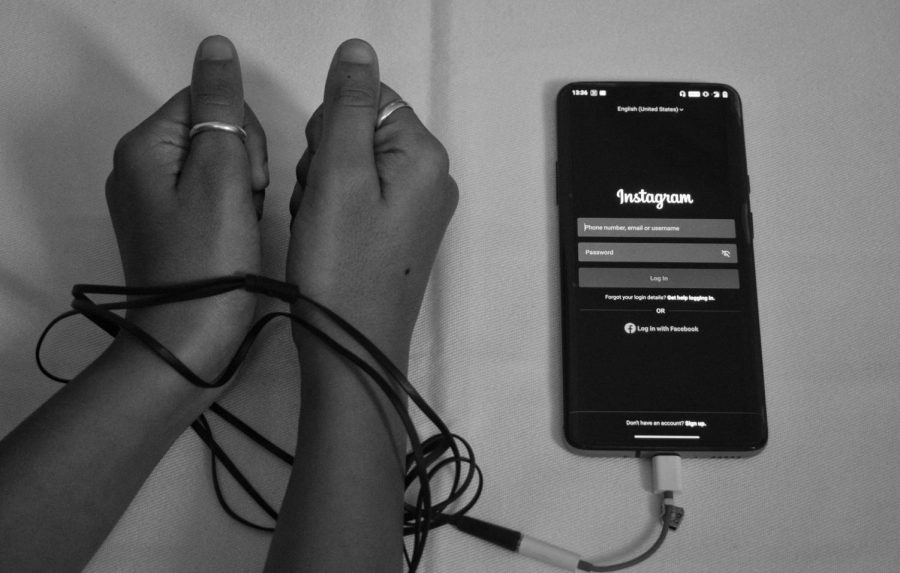School Isn’t The Only Thing Making You Depressed and Anxious. Social Media is too.
Did you know that researchers have found that social media usage can produce an increased risk of depression, anxiety, and even suicidal thoughts? Social media can be a source of knowledge and an outlet for expression in addition to entertainment, but it is far from safe for pre-teens and teens. Social media should not be allowed to be downloaded until the age of 15 to reduce the negative effects on mental stability, personal identity, and relationships.
When it comes to social media, the when matters. Doctor Lisa Coyne, a doctor at Harvard Medical School Affiliate, says, “The earlier teens start using social media, the greater impact the platforms have on mental health.” She found this was is especially true for females. “While teen males tend to express aggression physically,” she said, “females do so relationally by excluding others and sharing hurtful comments. Social media increases the opportunity for such harmful interactions.”
Social Media can be detrimental to those with developing brains like middle schoolers-Jaqueline Sperling, Ph.D., a physiologist at McLean Hospital, a Harvard Medical School Affiliate, researches anxiety disorders. She touches on the extremity of all the changes a middle schooler undergoes and continues to say, “As they [middle schoolers] go through puberty, they’re tasked with establishing their identity at a time when the frontal lobes in their brains are not fully developed, and there is a lack of impulse control.” Sperling continues, “It’s a very vulnerable population to have access to something where there is no stopgap before they post or press the send button.” Sperling suggests waiting until at least fourteen years of age before downloading social media.
Social Media and the comparisons of looks and achievements and the constant feedback of likes that it provides can have negative effects on personal identity. “The content we expose ourselves to on the media changes the way we think about ourselves and others. Young people are highly affected by the values embraced by media. In effect, media offers numerous interpretations of what is beautiful, sexy, attractive, and appropriate.” Bardone-Cone an Author from Penn State, says.
Bardone-Cone also found social media promoted poor body image and violent behavior in young people. “In an article by Bardone-Cone and Cass (2007), the authors stress how media imagery leads to heightened body dissatisfaction, putting teenagers at risk for eating disorders such as anorexia (especially girls). Specifically, exposure to pro-anorexia websites has negative effects on young women (Bardone-Cone & Cass, 2007). Schneider and colleagues (2012) stress that exposure to violent media content increases the probability of violent behaviors (especially among boys).”
Social media can cause negative effects on relationships. Kathryn Moore, a Ph.D. psychologist at Providence Saint John’s Child and Family Development Center in Santa Monica writes, “Cyberbullying, which 23% of teens report experiencing, can also negatively impact relationships, whether you are receiving mean comments or sending them to someone else.” While bullying is a well-known phenomenon, cyberbullying allows teens to hide behind a screen and often enables worse behavior. Cyberbullying can lead to extreme amounts of stress and anxiety causing teens to act out of being unnaturally aggressive causing anger towards relationships as a form of relieving stress.
Some say that social media is entertainment and most often used for fun, but evidence shows that its addictive qualities lead to increase in mental illness. Regardless of your initial intentions, social media, “activates the brain’s reward center by releasing dopamine, a ‘feel-good chemical’ linked to pleasurable activities such as sex, food, and social interaction. The platforms are designed to be addictive and are associated with anxiety, depression, and even physical ailments.” Coyne says. Delaying students’ start on social media would help mitigate some of these effects.
Coyne and Sperling are just a few researchers that show us the strong negatives that these “fun apps” cause. These effects don’t dissolve right after you delete the apps-they can cause long-term deficiencies but a delayed start can help. For those who have already involved themselves in the media, it is never too late to try to take breaks periodically.


